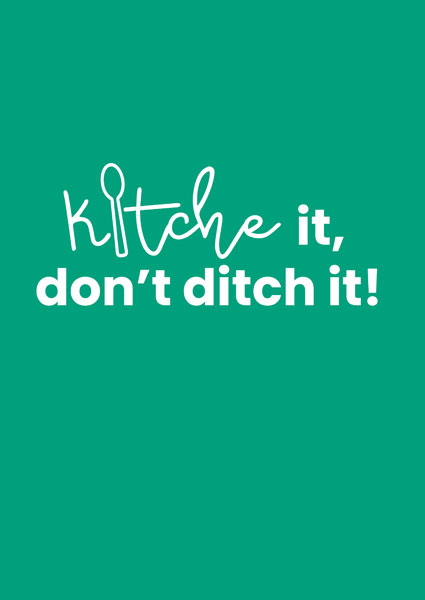I cook to live, my husband lives to cook.
We share the cooking. On my days everybody knows what they’ll be getting as I have four signature dishes (by signature dish, I mean ‘thing I can cook without a recipe’). I’m no foodie, I like to get cooking out of the way as quickly as possible so I can get on with living.
My cooking habits are good in terms of waste prevention because I buy the same things every week and everything gets used up.
Stressy
But my husband is a different animal. On his cooking days we never know what we’ll be getting because it seems to depend on what the food fairies whisper in his ear. I shop online because I hate supermarkets. If I ask him what he wants me to add to the online shop, he gets all stressy, saying ‘I can’t shop like that, I don’t know what I’ll feel like cooking!’ (No, I’m not married to Gordon Ramsay).
So I leave him to do his own shopping in person in the actual supermarket. He likes to see, touch and smell food; it inspires him. I think there must be some French strain somewhere in the Birmingham/Dundee DNA mash-up of his family.
This dual shopping routine is far from ideal, since it means he might buy things I’ve already bought. It’s why we ended up recently with three full jars of ground ginger. Not the end of the world, of course, since it stores well and we like ginger biscuits, but that’s the only over-consumption I’m admitting to since I’d be too ashamed to tell you the whole truth.
Unavoidable waste
Obviously, we compost unavoidable food waste in our Green Johanna, but composting should ideally be the final stage in the food waste hierarchy after meal planning and food storage. The environmental cost involved in the production and transporting of food is so high that prevention is better than composting.
We know we should plan meals in advance based on knowing what we already have. We know that, and yet sometimes the pace of modern life means we fall short. Stuff happens. We forget our list. We stress shop. Our husband fails to check the ground ginger situation.
So, when I read about the Kitche free mobile app I was immediately interested.
Kitche’s premise is that fighting food waste starts at home by buying what you eat and eating what you buy. If we did this, we would help prevent the staggering 4.5 million tonnes of food waste created in the UK each year – enough to fill eight Wembley stadiums.
It goes without saying that by doing this you will save yourself a chunk of money without even depriving yourself of anything. The average family in the UK throws food worth £730 in the bin every year. When it comes to tightening the belt on household expenditure, such unnecessary waste is low-hanging fruit.

Helping hand
We could all do with a helping hand, and that’s what this app is. It’s like a friend by your side when you’re out shopping reminding you that you have enough eggs already.
The app enables you to scan food products from major supermarkets receipts with a snap of your camera so you can keep track of food you’ve got at home, even when you’re on the move. It categorises the products, adds reminders and tracks where you create waste, so you’re shopping smartly, not blindly.
It’s also interestingly informative in a way my dreaded Domestic Science lessons at school never were. (Frankly, I never got over getting a rollicking for stirring a liquid jelly with a knife.)
There’s advice, such as:
Food tips
I confess I didn’t know this:
- Onions are best kept in a cool, dry, dark place (ideally in a cloth bag), not the fridge.
- When freezing milk – pour a little out first, such as in your tea/coffee, because milk will expand in its container.
- Every day we throw a combined 20 million slices of bread away – mostly because they’ve not been used in time. Freeze it instead – you can use it straight from frozen in the toaster.
What’s in season
There’s a monthly A- Z of fruit and veg so you can shop seasonally. Why is this important? Because more energy is needed to transport, refrigerate and store foods from afar. Buying seasonally also saves money because the food is usually in abundance and lasts longer. It also supports the local economy.
How to store things.
The Can I Freeze It? section is especially useful. In future I’ll be freezing chopped herbs in an ice cube tray covered with water. They can then be cooked from frozen in casseroles, stews and sauces.
Recipes
Recipes can be suggested based on what you already have in. I love the recipe for bruschetta that can be adapted to use up just about every leftover you can think of. I need ideas like this because, as I said, I’m no foodie. I’m not that person who can create a delicious meal from whatever’s wilting at the back of the fridge. Fortunately, I’ve got a new friend who can.
Importantly, the app also gets children involved with the use of activity packs.
A few years ago, while talking to a Swedish businessman, I told him how impressed I was at the way waste prevention and recycling were at the heart of Swedish life. How had they managed this as a modern, western, consumer society? His answer was simple – education.
Children must be part of every step forward we make. They are creative and logical thinkers. Meal planning, food storage, cooking and portion control will make perfect sense to them. Going forward they will do this stuff as a matter of course.
As I said, Kitche is the best kind of friend and teacher.
I bet they wouldn’t even mind if you stirred jelly with a knife.
Julie



